



 O MY BELOVED CHILDREN, JOHN Melick and Jennifer Aniston, with love and gratitude for the gift of motherhood. To Joan, Jean, Linda, and Sally for the gift of sisterhood.
O MY BELOVED CHILDREN, JOHN Melick and Jennifer Aniston, with love and gratitude for the gift of motherhood. To Joan, Jean, Linda, and Sally for the gift of sisterhood.
CONTENTS
Foreword
Penelope Savalas Boardman
FOREWORD
 ANCY HAS ALWAYS BEEN A part of my life. Ours is a friendship I dearly cherish. I have heard fragments of her story over the years but never the whole. I am extremely proud of Nancy for finding her own voice and not writing as someone's daughter, wife, ex-wife, or mother. This book compiles Nancy's reminiscences and reflections expressed from her unique perspective. That may not seem terribly monumental to my generation of women, but it is.
ANCY HAS ALWAYS BEEN A part of my life. Ours is a friendship I dearly cherish. I have heard fragments of her story over the years but never the whole. I am extremely proud of Nancy for finding her own voice and not writing as someone's daughter, wife, ex-wife, or mother. This book compiles Nancy's reminiscences and reflections expressed from her unique perspective. That may not seem terribly monumental to my generation of women, but it is.
I am considered by those who apply these kinds of categories as a member of Generation X. While I do not place a lot of value on labels, certain generalizations are true; women of my generation tend to take for granted the great strides that our predecessors, Baby Boomer women, made toward advancing women's opportunities. The choices available to us were unimaginable to Nancy and my own mother. They followed the rules and did what their fathers and husbands expected of them. Nancy and my mother each became divorce statistics in the 1970s. By then feminism was radicalized, and no matter what each felt about the inequities of their lot, they still had children to raise, feed, and educate. They were not emotionally disposed to joining the cause, or raised to necessarily think for themselves or of themselves.
By telling her story, Nancy has come to express her point of view with characteristic sensitivity to others. Her thoughtful explanation of events, and of her feelings and actions, have helped me to come to an understanding of my own mother. This journal of family history will undoubtedly assure appreciation of Nancy by her little grandchild.
PREFACE
 HE OFTEN DEBATED VIEW THAT it's better to parent like a friend began to take hold in our culture when I was raising my two children, Johnny and Jennifer. I didn't subscribe to this view because I believed that dependent children need "parents" to guide them. At seventeen my son left home to attend college in another state and the tendency to nurture him weaned quite naturally. With my daughter it was entirely different.
HE OFTEN DEBATED VIEW THAT it's better to parent like a friend began to take hold in our culture when I was raising my two children, Johnny and Jennifer. I didn't subscribe to this view because I believed that dependent children need "parents" to guide them. At seventeen my son left home to attend college in another state and the tendency to nurture him weaned quite naturally. With my daughter it was entirely different.
A few months after Johnny moved away my husband and I divorced. Jen was only nine years old when half of our family left home and as often happens with a single parent, an especially close bond was forged between us. But by the time she was in her mid-twenties differences in our thinking led to estrangement. I was devastated. I began to write a journal of happy memories to help manage the pain, and in the process I came to realize that our "close" relationship was actually codependent and needed to change. I discovered that the roles of both mother and daughter must give way to a more mutually understanding, nonjudgmental, and respectful relationship that is more akin to what often takes place between good friends.
In recent years life experiences, both our own and those of others, have tended to replace social mores and dictates as the way many people formulate their philosophical approach to life's challenges. I believe that this tendency is evident in the abundance of support groups and self-improvement books that help us to think our way through emotional pain. I've written my story in the fervent hope of making a similar contribution.
Author's note: Some names have been changed to protect the privacy of certain individuals.
ACKNOWLEDGMENTS
 WISH TO EXPRESS my gratitude to Coral Leigh, a friend who, from the beginning, understood and believed in the need for women to tell their stories. Her encouragement helped launch this project and was the force that carried me forward, many times, when I wanted to give up. I'm also grateful to Mala Powers, Diane Davenport, Leigh Lombardi, Penelope Savalas Boardman, and Bari Borsky who so generously gave of their time to read and reread my manuscript, offering suggestions while lavishing help and unwavering support. My gratitude goes to those friends who, through the years, witnessed the twists and turns of my destiny, for taking the time to carefully read through the text for objectivity and/or accuracy, and for their well-timed words of support-in addition to those mentioned above: John and Susan Dooley, Reverend Jim Hindes, Lynn Savalas, Lee and Penny Thompson, Jack Thomas, and Patti Secrease. To my big sisters Joan and jean who parented me when I was little and at times when I wasn't, thank you for your enthusiasm and pep talks to "get it out there" My deepest gratitude is reserved for Molly Reynolds for the light of her love that shines then and now. And finally to Steven L. Mitchell, my editor at Prometheus Books, who guided me through the very complicated process of publishing with patience, understanding, humor, honesty, and an admirable sense of fairness.
WISH TO EXPRESS my gratitude to Coral Leigh, a friend who, from the beginning, understood and believed in the need for women to tell their stories. Her encouragement helped launch this project and was the force that carried me forward, many times, when I wanted to give up. I'm also grateful to Mala Powers, Diane Davenport, Leigh Lombardi, Penelope Savalas Boardman, and Bari Borsky who so generously gave of their time to read and reread my manuscript, offering suggestions while lavishing help and unwavering support. My gratitude goes to those friends who, through the years, witnessed the twists and turns of my destiny, for taking the time to carefully read through the text for objectivity and/or accuracy, and for their well-timed words of support-in addition to those mentioned above: John and Susan Dooley, Reverend Jim Hindes, Lynn Savalas, Lee and Penny Thompson, Jack Thomas, and Patti Secrease. To my big sisters Joan and jean who parented me when I was little and at times when I wasn't, thank you for your enthusiasm and pep talks to "get it out there" My deepest gratitude is reserved for Molly Reynolds for the light of her love that shines then and now. And finally to Steven L. Mitchell, my editor at Prometheus Books, who guided me through the very complicated process of publishing with patience, understanding, humor, honesty, and an admirable sense of fairness.
Chapter 1
 T WAS FEBRUARY 1996, AND I still felt the glow from a glorious Christmas with my two children. I had no idea that the rogue tabloid media was about to attack my family.
T WAS FEBRUARY 1996, AND I still felt the glow from a glorious Christmas with my two children. I had no idea that the rogue tabloid media was about to attack my family.
Unsuspecting, I entered a room at the luxurious Peninsula Hotel in Beverly Hills to tape my first televised interview. Through an agreement I had made with the producers of the show, the interview was to be restricted to the Waldorf method of teaching-it was not to be about my celebrity daughter!
As I checked my hair and makeup in a lavish powder room of marble and mirrored walls, I felt a bit uneasy. I wanted to tell Jen that I had been given this chance to inform people about her old school, but I wasn't able to reach her. My friend Dodi had suggested that she come with me; I felt a surge of gratitude as I found myself comforted by her effusive support.
"Ms. Aniston, we're almost ready."
I climbed over lighting equipment and slipped into the chair facing a young woman who responded to the concern on my face. "Don't worry, I know it's your first interview. I will keep our promise and limit my questions to your topic."

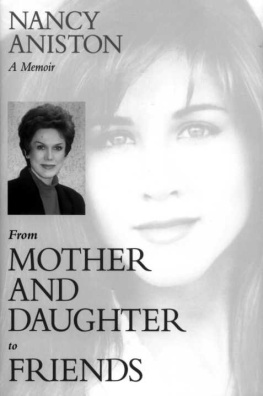
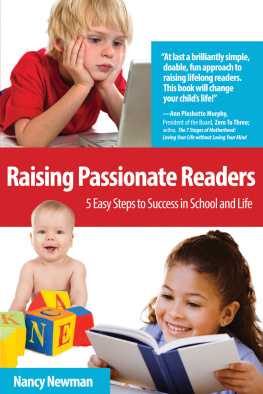
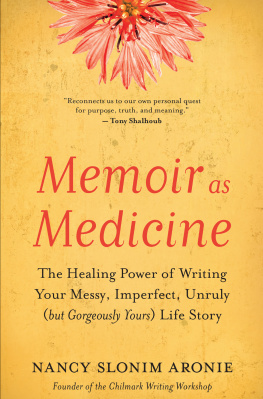

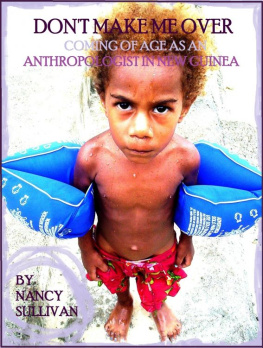
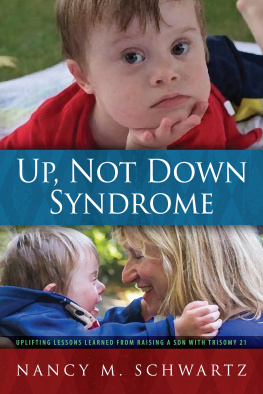
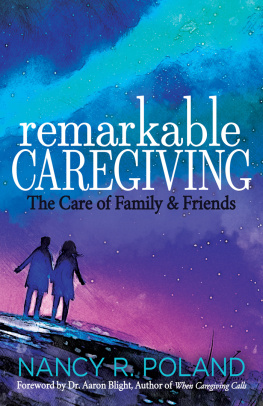
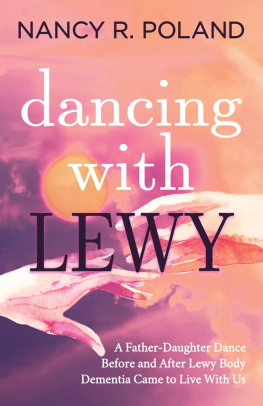
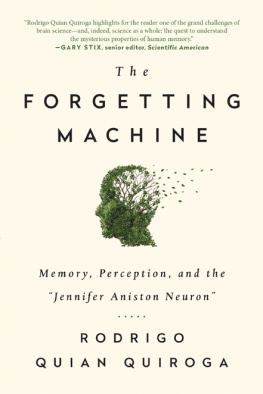
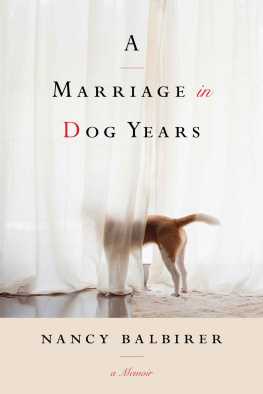






 O MY BELOVED CHILDREN, JOHN Melick and Jennifer Aniston, with love and gratitude for the gift of motherhood. To Joan, Jean, Linda, and Sally for the gift of sisterhood.
O MY BELOVED CHILDREN, JOHN Melick and Jennifer Aniston, with love and gratitude for the gift of motherhood. To Joan, Jean, Linda, and Sally for the gift of sisterhood. ANCY HAS ALWAYS BEEN A part of my life. Ours is a friendship I dearly cherish. I have heard fragments of her story over the years but never the whole. I am extremely proud of Nancy for finding her own voice and not writing as someone's daughter, wife, ex-wife, or mother. This book compiles Nancy's reminiscences and reflections expressed from her unique perspective. That may not seem terribly monumental to my generation of women, but it is.
ANCY HAS ALWAYS BEEN A part of my life. Ours is a friendship I dearly cherish. I have heard fragments of her story over the years but never the whole. I am extremely proud of Nancy for finding her own voice and not writing as someone's daughter, wife, ex-wife, or mother. This book compiles Nancy's reminiscences and reflections expressed from her unique perspective. That may not seem terribly monumental to my generation of women, but it is. HE OFTEN DEBATED VIEW THAT it's better to parent like a friend began to take hold in our culture when I was raising my two children, Johnny and Jennifer. I didn't subscribe to this view because I believed that dependent children need "parents" to guide them. At seventeen my son left home to attend college in another state and the tendency to nurture him weaned quite naturally. With my daughter it was entirely different.
HE OFTEN DEBATED VIEW THAT it's better to parent like a friend began to take hold in our culture when I was raising my two children, Johnny and Jennifer. I didn't subscribe to this view because I believed that dependent children need "parents" to guide them. At seventeen my son left home to attend college in another state and the tendency to nurture him weaned quite naturally. With my daughter it was entirely different. WISH TO EXPRESS my gratitude to Coral Leigh, a friend who, from the beginning, understood and believed in the need for women to tell their stories. Her encouragement helped launch this project and was the force that carried me forward, many times, when I wanted to give up. I'm also grateful to Mala Powers, Diane Davenport, Leigh Lombardi, Penelope Savalas Boardman, and Bari Borsky who so generously gave of their time to read and reread my manuscript, offering suggestions while lavishing help and unwavering support. My gratitude goes to those friends who, through the years, witnessed the twists and turns of my destiny, for taking the time to carefully read through the text for objectivity and/or accuracy, and for their well-timed words of support-in addition to those mentioned above: John and Susan Dooley, Reverend Jim Hindes, Lynn Savalas, Lee and Penny Thompson, Jack Thomas, and Patti Secrease. To my big sisters Joan and jean who parented me when I was little and at times when I wasn't, thank you for your enthusiasm and pep talks to "get it out there" My deepest gratitude is reserved for Molly Reynolds for the light of her love that shines then and now. And finally to Steven L. Mitchell, my editor at Prometheus Books, who guided me through the very complicated process of publishing with patience, understanding, humor, honesty, and an admirable sense of fairness.
WISH TO EXPRESS my gratitude to Coral Leigh, a friend who, from the beginning, understood and believed in the need for women to tell their stories. Her encouragement helped launch this project and was the force that carried me forward, many times, when I wanted to give up. I'm also grateful to Mala Powers, Diane Davenport, Leigh Lombardi, Penelope Savalas Boardman, and Bari Borsky who so generously gave of their time to read and reread my manuscript, offering suggestions while lavishing help and unwavering support. My gratitude goes to those friends who, through the years, witnessed the twists and turns of my destiny, for taking the time to carefully read through the text for objectivity and/or accuracy, and for their well-timed words of support-in addition to those mentioned above: John and Susan Dooley, Reverend Jim Hindes, Lynn Savalas, Lee and Penny Thompson, Jack Thomas, and Patti Secrease. To my big sisters Joan and jean who parented me when I was little and at times when I wasn't, thank you for your enthusiasm and pep talks to "get it out there" My deepest gratitude is reserved for Molly Reynolds for the light of her love that shines then and now. And finally to Steven L. Mitchell, my editor at Prometheus Books, who guided me through the very complicated process of publishing with patience, understanding, humor, honesty, and an admirable sense of fairness.
 T WAS FEBRUARY 1996, AND I still felt the glow from a glorious Christmas with my two children. I had no idea that the rogue tabloid media was about to attack my family.
T WAS FEBRUARY 1996, AND I still felt the glow from a glorious Christmas with my two children. I had no idea that the rogue tabloid media was about to attack my family.